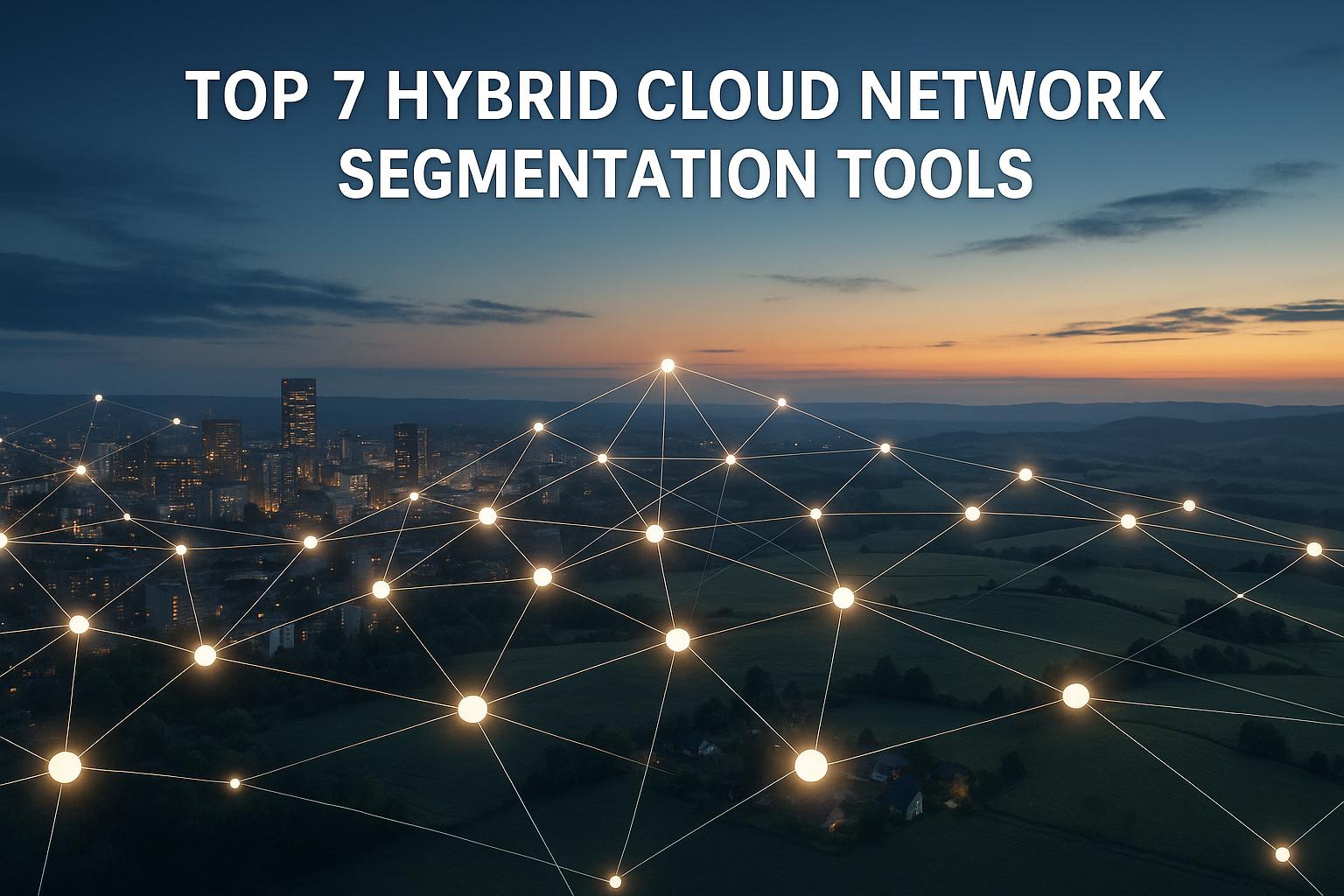Hybrid cloud network segmentation is critical for securing distributed IT environments across on-premises and cloud platforms. For UK businesses in 2025, it’s a key strategy to meet GDPR compliance, reduce data breach risks (average cost: £4.56 million), and maintain consistent security policies. This article breaks down the seven best tools for hybrid cloud segmentation, highlighting their features, compliance capabilities, and automation benefits.
Top Tools:
- ManageEngine OpManager Plus: Combines network monitoring with segmentation; ideal for SMEs with hybrid setups.
- Cisco Secure Workload: Advanced workload-level segmentation; strong compliance features.
- VMware NSX: Best for VMware-heavy environments; supports microsegmentation and distributed firewalls.
- Illumio Core: Zero Trust segmentation with risk dashboards and automated policies.
- Akamai Guardicore Segmentation: Flexible for hybrid and legacy systems; visual traffic mapping.
- Tufin: Simplifies policy management for complex hybrid infrastructures.
- Tigera Calico: Focused on containers and dynamic workloads; strong for Kubernetes environments.
Key Features to Consider:
- Hybrid Cloud Support: Consistent policies across on-premises, public, and private clouds.
- Zero Trust Capabilities: Identity-based segmentation and threat containment.
- Automation: Policy recommendations, enforcement, and reduced manual work.
- Compliance Tools: GDPR-focused audit trails, reporting, and policy templates.
- Integration: Compatibility with DevOps workflows and CI/CD pipelines.
These tools address challenges like monitoring blind spots, misconfigurations, and regulatory demands. For tailored deployments, consulting experts like Hokstad Consulting can help optimise solutions for UK-specific compliance and security needs.
Quick Comparison Table:
| Tool | Hybrid Support | Zero Trust Features | Automation Capabilities | Compliance Tools |
|---|---|---|---|---|
| ManageEngine OpManager Plus | Hybrid, multi-cloud | Basic microsegmentation | AI-driven anomaly detection | GDPR audit logs, reporting |
| Cisco Secure Workload | Multi-cloud, on-prem | Workload-level policies | Automated policy enforcement | Detailed GDPR compliance tools |
| VMware NSX | VMware, hybrid | Distributed firewalls | Declarative APIs | Built-in compliance reporting |
| Illumio Core | Hybrid, multi-cloud | Fine-grained segmentation | Automated policy generation | Risk dashboards, GDPR support |
| Akamai Guardicore | Hybrid, legacy systems | Visual traffic mapping | Policy automation | Regulatory compliance mapping |
| Tufin | Hybrid, multi-cloud | Granular access controls | Traffic mapping, policy updates | Automated compliance checks |
| Tigera Calico | Containers, hybrid | Dynamic segmentation | Behaviour-based recommendations | Detailed audit trails |
Choosing the right tool depends on your infrastructure, compliance needs, and growth plans. For expert advice, Hokstad Consulting can assist with implementation and optimisation.
Solve hybrid network security challenges with segmentation
How to Choose Hybrid Cloud Network Segmentation Tools
Choosing the right hybrid cloud network segmentation tool involves weighing several key factors. Hybrid environments are complex, so the tools you select should handle policies across different platforms efficiently while adhering to UK regulatory standards.
One of the most important features is support for hybrid and multi-cloud environments. The tool should ensure consistent policy enforcement and provide visibility across on-premises, public, and private cloud resources. Centralised management is vital for maintaining uniform security policies, especially for UK organisations in industries like finance and healthcare, where multi-cloud strategies are common.
Zero Trust capabilities are now essential in combating modern threats. Tools need to include granular policy enforcement, identity-based segmentation, and real-time threat detection. Gartner predicts that by 2026, 60% of enterprises will adopt Zero Trust network segmentation for hybrid cloud environments, a significant rise from less than 20% in 2022 [4]. These features not only improve security but also enable greater automation and visibility.
Speaking of automation, this is another critical aspect. Top-tier tools offer automated policy recommendations, dynamic segmentation, and automatic policy enforcement. These features reduce manual work and minimise errors. Research from AIMultiple highlights that automation in network segmentation can cut manual policy management time by up to 70% for large enterprises [3]. This efficiency is invaluable for organisations managing complex environments.
Analytics and visibility are equally crucial. Look for tools that provide real-time traffic flow mapping, application dependency mapping, and dashboards for monitoring risks and compliance. These capabilities allow security teams to detect anomalies and make informed decisions based on data.
Integration with DevOps workflows is becoming a must-have. Tools with API-driven automation, self-service policy management, and compatibility with CI/CD workflows enable a security-as-code approach. This allows DevOps teams to embed segmentation policies into deployment processes, reducing friction and ensuring compliance.
For UK organisations, compliance with local regulations like GDPR is non-negotiable. The tool should offer features such as audit trails, data residency controls, role-based access, and policy templates tailored to regulatory requirements. These capabilities simplify data protection and incident reporting in line with UK laws.
When evaluating tools, don’t overlook the total cost of ownership and licensing options. Pricing models can vary widely, from subscription-based SaaS to pay-as-you-go or perpetual licences. Look for solutions that provide transparent pricing, support local currency, and deliver value without hidden costs.
Lastly, consider scalability and performance. Tools must handle current workloads while being flexible enough to accommodate future growth. This is especially important for large enterprises managing thousands of workloads across diverse environments.
For additional support, consulting firms like Hokstad Consulting can help integrate these tools into your DevOps processes and optimise hybrid cloud environments. Their expertise ensures that the chosen solutions align with both business objectives and regulatory standards.
1. ManageEngine OpManager Plus
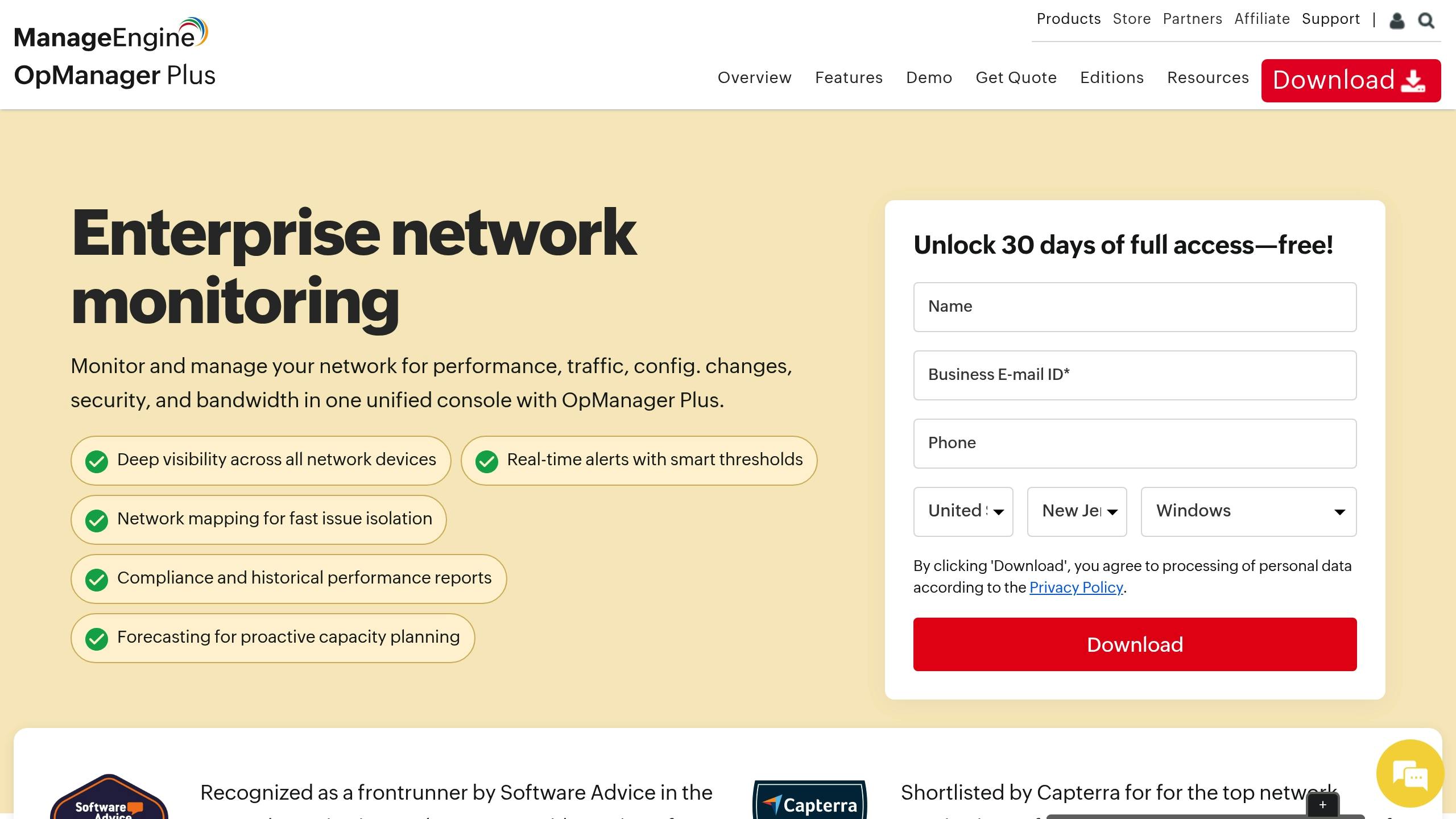
ManageEngine OpManager Plus is a robust tool designed to simplify network segmentation by combining network monitoring and configuration management. It’s built to handle diverse environments, ensuring seamless segmentation across local and cloud-based infrastructures.
Support for Hybrid and Multi-Cloud Environments
OpManager Plus offers centralised monitoring and configuration management for networks spread across hybrid and multi-cloud setups. Its unified dashboards provide a clear, real-time view of network performance and traffic patterns, whether from local data centres or multiple cloud providers. This centralised approach eliminates the need to rely on separate tools for different network segments, streamlining operations into a single, user-friendly interface.
By consolidating these functionalities, OpManager Plus not only simplifies network management but also strengthens its segmentation capabilities, ensuring administrators can efficiently oversee distributed resources.
Zero Trust and Microsegmentation Capabilities
OpManager Plus supports Zero Trust principles, allowing administrators to isolate network segments and enforce specific policies to limit access and minimise lateral movement risks. For example, sensitive areas of the network can be isolated with tailored access controls to enhance security. While these features are powerful, organisations with advanced microsegmentation needs may benefit from integrating OpManager Plus with specialised security tools to achieve even greater control.
Automation and Policy Management Features
The platform leverages automation to reduce manual effort and improve accuracy. From configuration management to adaptive thresholds and policy enforcement, OpManager Plus uses AI-driven insights to predict and address potential issues before they escalate. Its machine learning algorithms process a vast array of network metrics to identify anomalies, enabling proactive responses and reducing downtime.
Compliance and Reporting Tools
In addition to its operational strengths, OpManager Plus simplifies compliance reporting, particularly for businesses in the UK. It offers detailed audit logs, customisable dashboards, and compliance reports tailored to meet regulations like the GDPR. These features provide clear evidence of effective segmentation and security controls during audits.
Reports can be exported in formats suitable for UK regulatory bodies, ensuring businesses meet local standards. The tool’s firewall management capabilities further support compliance by enforcing segmentation and access control policies. For those working with Hokstad Consulting, OpManager Plus delivers detailed insights to help optimise resources while maintaining GDPR compliance.
UK organisations can explore these features with a 30-day free trial, giving them the opportunity to test its effectiveness within their hybrid cloud environments before committing to a purchase.
2. Cisco Secure Workload
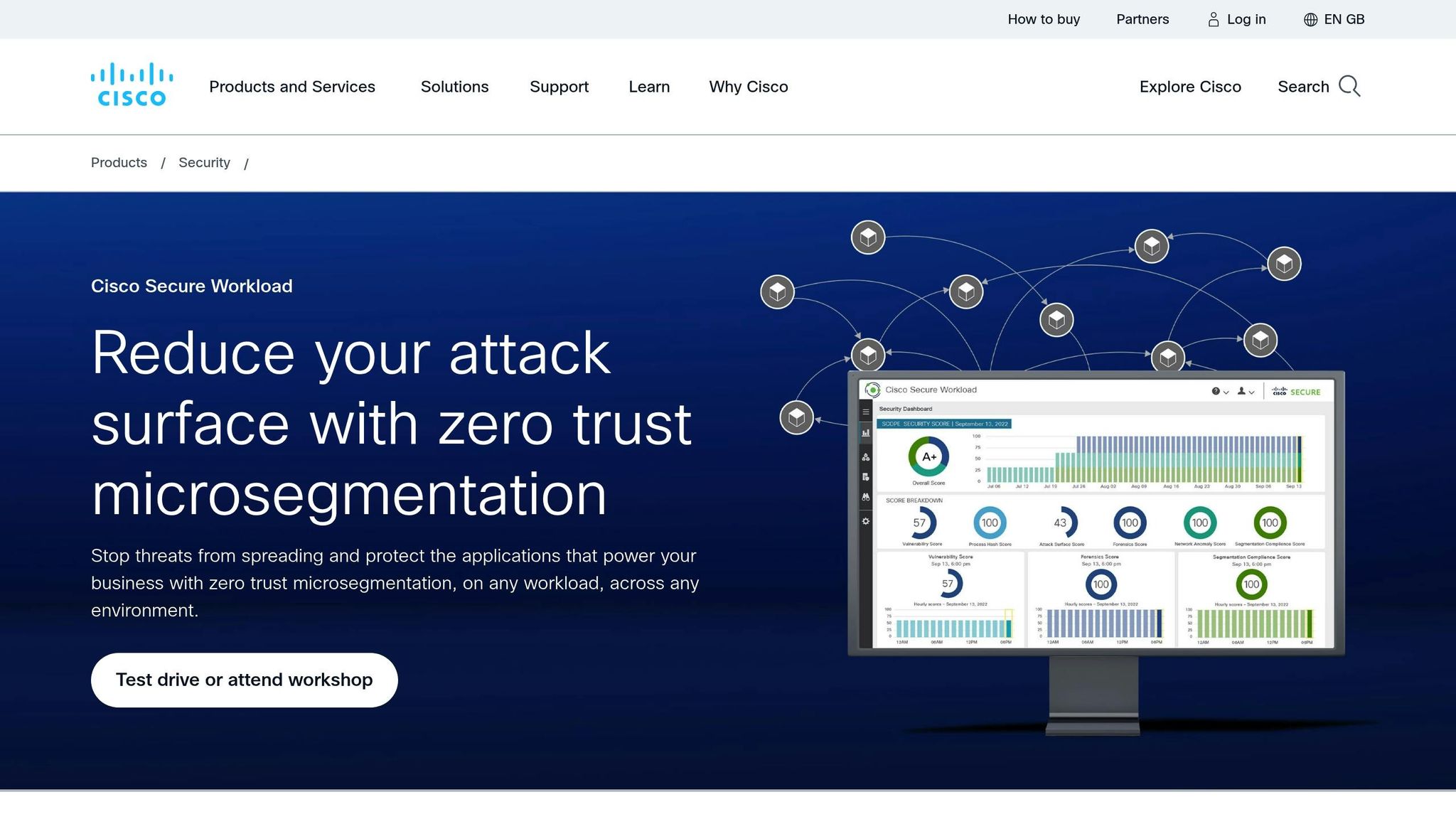
Cisco Secure Workload, previously known as Cisco Tetration, offers advanced protection for workloads in complex hybrid environments. It provides the deep visibility that UK businesses often require to maintain robust security.
Support for Hybrid and Multi-Cloud Environments
Cisco Secure Workload functions seamlessly across on-premises data centres, public cloud platforms like AWS, Azure, and Google Cloud, as well as private cloud setups [3]. This flexibility is particularly advantageous for UK organisations navigating stringent regulatory requirements while scaling their operations. By unifying security policies across all environments, it removes the hassle of managing separate frameworks. For instance, one UK financial institution reported quicker incident response times and better compliance reporting thanks to this unified approach [3]. This multi-cloud compatibility also strengthens its Zero Trust security framework.
Zero Trust and Microsegmentation Capabilities
The platform enforces Zero Trust principles by applying least-privilege access controls directly at the workload level [2][3]. It analyses application dependencies and network activity to create precise policies that limit communication between workloads. This microsegmentation strategy helps to contain threats by restricting their lateral movement within the network [2][3]. Additionally, the system automates the discovery of application dependencies and maps traffic flows, making it easier to establish effective segmentation policies - traditionally a challenging task [3].
Automation and Policy Management Features
With automated policy discovery and enforcement, Cisco Secure Workload simplifies segmentation management through a centralised dashboard. This reduces the risk of human error and ensures policies are consistently applied. The system also performs continuous validation of security policies, adapting as applications and infrastructure evolve [2][3].
Compliance and Reporting Tools
Cisco Secure Workload is equipped with tools to support GDPR compliance, including detailed audit trails, logs of policy changes [3], and comprehensive segmentation reports. These reports cover metrics like compliance rates, policy violations, and risk reduction, providing measurable insights [2][3]. Such features not only simplify audits but also assist with regulatory submissions by clearly documenting security measures.
3. VMware NSX
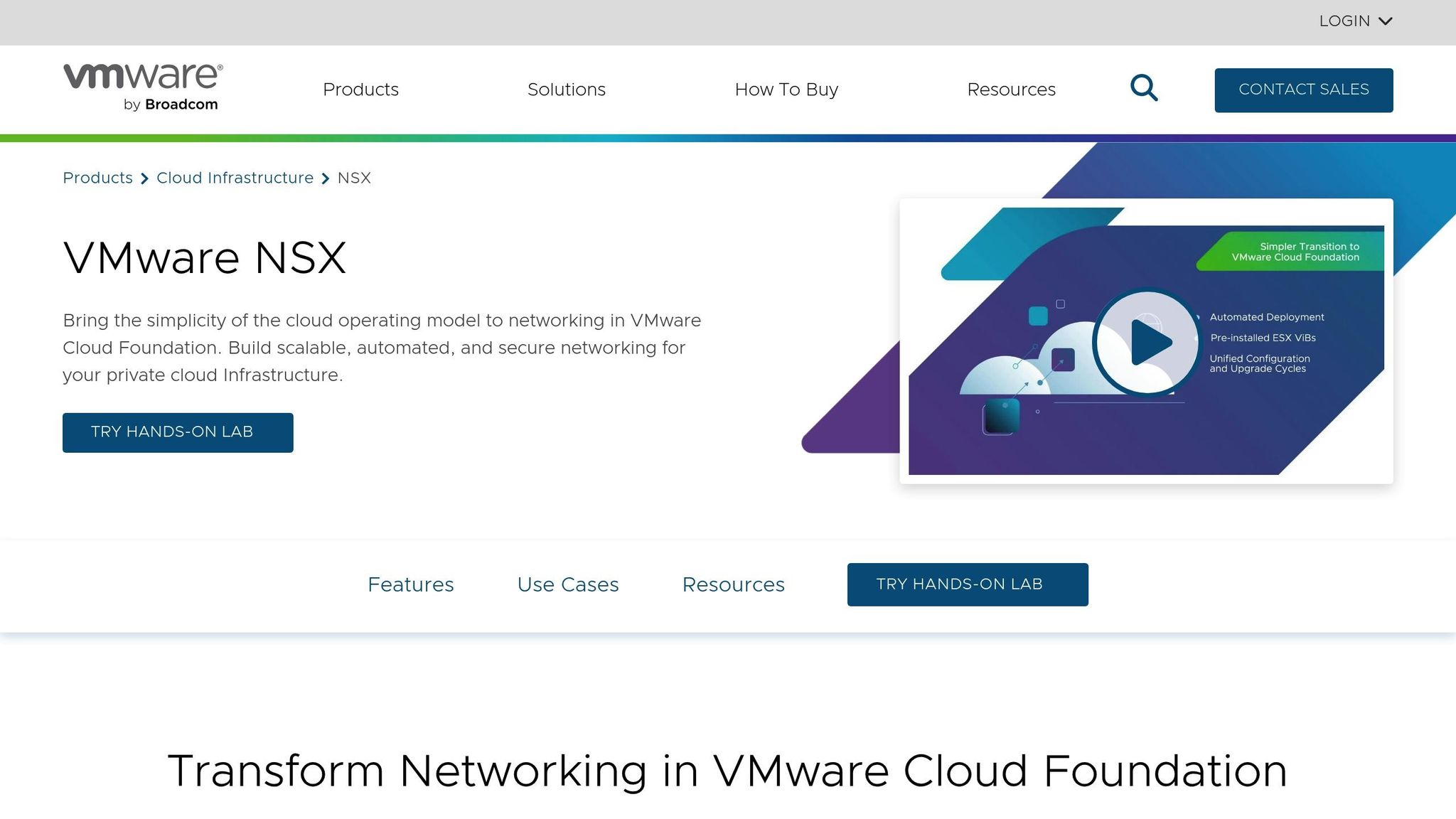
VMware NSX stands out as a software-defined networking (SDN) platform designed to provide advanced segmentation for hybrid cloud environments. Built on network virtualisation technology, it delivers microsegmentation and distributed firewall functionality, seamlessly integrating with VMware's ecosystem.
Support for Hybrid and Multi-Cloud Environments
NSX offers a unified networking solution that simplifies security management across on-premises data centres, private clouds, and leading public cloud providers. For UK businesses, this means consistent security policies across all environments, which not only streamlines governance but also helps reduce operational risks [5]. Since NSX is software-defined, its policies move with workloads as they transition between environments. This flexibility is particularly valuable for organisations scaling operations while meeting strict regulatory requirements. Additionally, its microsegmentation features provide an extra layer of security.
Zero Trust and Microsegmentation Capabilities
By implementing Zero Trust principles, NSX ensures security at the workload level through microsegmentation. Using distributed firewalls embedded at the hypervisor level, NSX restricts access to only essential communications for each workload. This approach limits lateral movement within the network and minimises the impact of potential breaches [1][5]. For example, a UK healthcare provider successfully used NSX to segment its hybrid environment, which included on-premises data centres and Microsoft Azure workloads. This allowed them to isolate sensitive patient data, enforce strict access controls, and quickly adapt to changing compliance demands.
Automation and Policy Management Features
NSX simplifies policy management with declarative APIs that automate enforcement, reducing manual configuration errors and speeding up deployment [5]. Its centralised dashboard makes it easier to create and enforce policies, cutting down on manual effort and minimising human error. For instance, a UK-based e-commerce company can use NSX to apply updated segmentation policies to new application instances during high-demand periods, ensuring strong security without disrupting operations. NSX also integrates with DevOps tools like Kubernetes and Terraform, making it possible to embed network segmentation into CI/CD pipelines and automatically apply policies to new container workloads [5].
Compliance and Reporting Tools
NSX comes equipped with compliance and reporting tools that provide detailed insights into network traffic, policy enforcement, and security events. These features help UK organisations demonstrate compliance with regulations like GDPR, which is crucial for handling personal data. Automated logging and reporting simplify responses to audits or security incidents, offering clear insights into policy violations, compliance levels, and risk reduction [5].
To fully optimise NSX deployments, UK organisations can turn to Hokstad Consulting for expert guidance, helping them improve security while managing costs in hybrid cloud environments.
4. Illumio Core
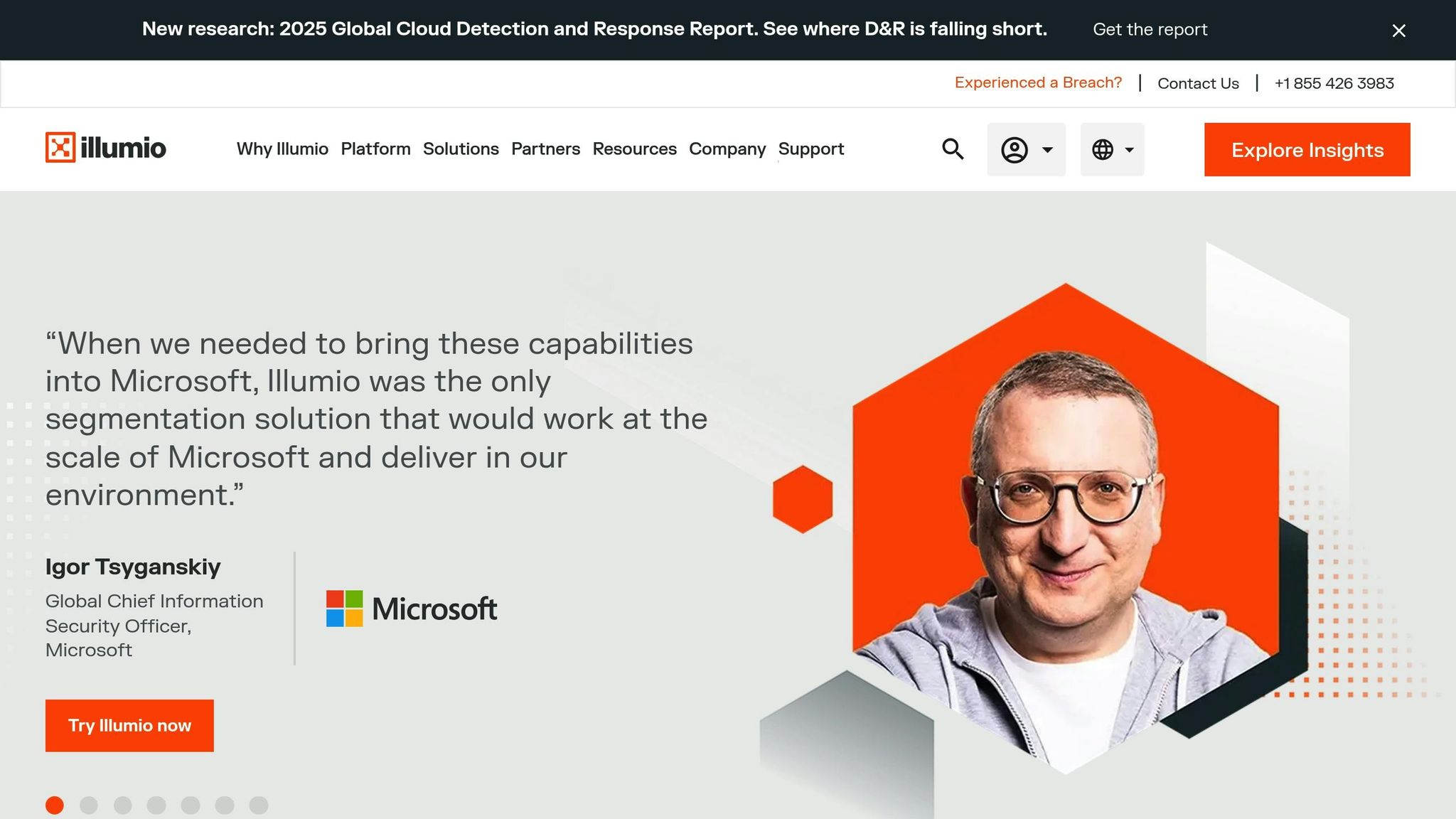
Illumio Core delivers microsegmentation for hybrid and multi-cloud environments, helping to block lateral movement and limit breaches through automated policy enforcement and detailed application dependency mapping.
Support for Hybrid and Multi-Cloud Environments
Illumio Core ensures consistent security policies across both on-premises data centres and public cloud platforms, a crucial feature for UK businesses juggling complex hybrid infrastructures [4]. Whether workloads are hosted on AWS, Microsoft Azure, or traditional data centres, the same segmentation controls apply.
For example, a UK healthcare provider used Illumio Core to segment patient data across NHS data centres and Microsoft Azure. By mapping dependencies and automating policies, they not only reduced breach risks but also met NHS Digital compliance standards. Similarly, financial services firms in the UK benefit from consistent segmentation across AWS, Azure, and on-premises servers, simplifying regulatory compliance and easing management challenges [4]. This seamless enforcement complements broader hybrid security strategies.
Zero Trust and Microsegmentation Capabilities
Illumio Core operates on a Zero Trust principle, considering all traffic untrusted unless explicitly authorised. Its microsegmentation capabilities create fine-grained security zones, minimising the attack surface and containing breaches. This approach allows organisations to act within minutes to stop threats like ransomware from spreading to critical systems.
Dashboards provide risk reduction metrics, helping UK organisations measure the impact of their segmentation policies and present these improvements to stakeholders.
Automation and Policy Management Features
By analysing application dependencies, Illumio Core automatically generates segmentation policies, cutting down on manual tasks and reducing the likelihood of errors. This allows for quick deployment of policies for new cloud applications while offering clear visibility into potentially risky traffic flows.
Compliance and Reporting Tools
Illumio Core includes dashboards that monitor segmentation policies, risk reduction, and control effectiveness. These tools simplify compliance with UK GDPR and PCI DSS requirements and make audits less burdensome. Additionally, risk metrics provide a clear way to justify security investments and demonstrate return on investment.
UK organisations can also turn to Hokstad Consulting for expert advice on optimising Illumio Core deployments to align with both regulatory standards and business objectives.
Need help optimizing your cloud costs?
Get expert advice on how to reduce your cloud expenses without sacrificing performance.
5. Akamai Guardicore Segmentation
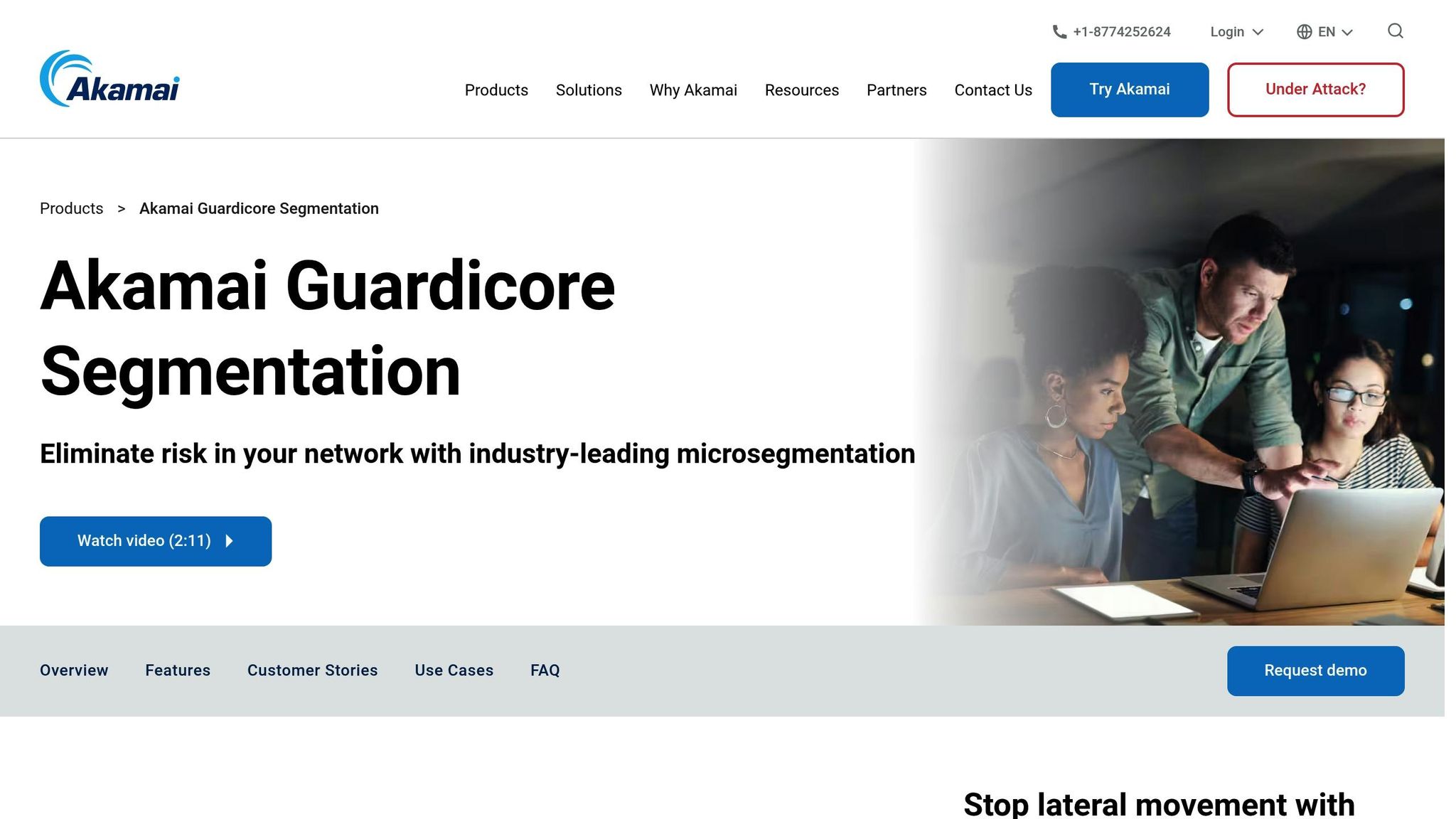
Akamai Guardicore Segmentation (previously known as Guardicore Centra) is a software-driven microsegmentation solution designed for organisations managing hybrid, multi-cloud, and legacy systems. This makes it particularly relevant for UK businesses that often operate within diverse IT environments.
Support for Hybrid and Multi-Cloud Environments
Akamai Guardicore Segmentation is built to work seamlessly across on-premises data centres, public cloud platforms, and legacy systems. For UK enterprises juggling multiple environments, this ensures uniform policies are applied everywhere, simplifying compliance with local regulations. Its flexibility allows businesses to secure their IT infrastructure without the need for extensive network overhauls, making it an excellent choice for those transitioning to modern cloud platforms. With this capability, organisations can maintain scalable, efficient operations while strengthening their security posture.
Zero Trust and Microsegmentation Capabilities
This platform embraces Zero Trust principles, enforcing strict access controls and using microsegmentation to isolate critical assets. By segmenting down to the level of individual workloads, it reduces the attack surface and prevents unauthorised lateral movement within the network. Additionally, the platform features visual network traffic mapping, which reveals east–west traffic flows and application dependencies. This helps security teams identify vulnerabilities more effectively and respond to potential threats with speed and precision.
Automation and Policy Management Features
Akamai Guardicore Segmentation simplifies the management of security policies through automation. It translates high-level security requirements into device configurations, eliminating the need for manual adjustments. With its centralised dashboard and automated network mapping, the platform provides real-time policy recommendations, reducing errors and administrative overhead. This automation not only streamlines segmentation management but also helps optimise resource use, ultimately cutting cloud-related costs.
Compliance and Reporting Tools
Beyond its technical strengths, the platform supports regulatory compliance with built-in tools for generating detailed audit trails and compliance reports. This is particularly useful for meeting GDPR and other UK/EU data protection standards. Organisations can monitor key metrics - such as the number of enforced segmentation policies, reductions in lateral movement incidents, and time-to-threat detection and response - to measure the success of their security efforts and identify areas for improvement.
Akamai Guardicore Segmentation can be deployed as a SaaS solution or on a dedicated network appliance, offering the flexibility to meet a variety of organisational needs. For UK businesses looking to refine their hybrid cloud segmentation strategies, Hokstad Consulting provides tailored advice to ensure deployments align with both regulatory requirements and business goals.
6. Tufin
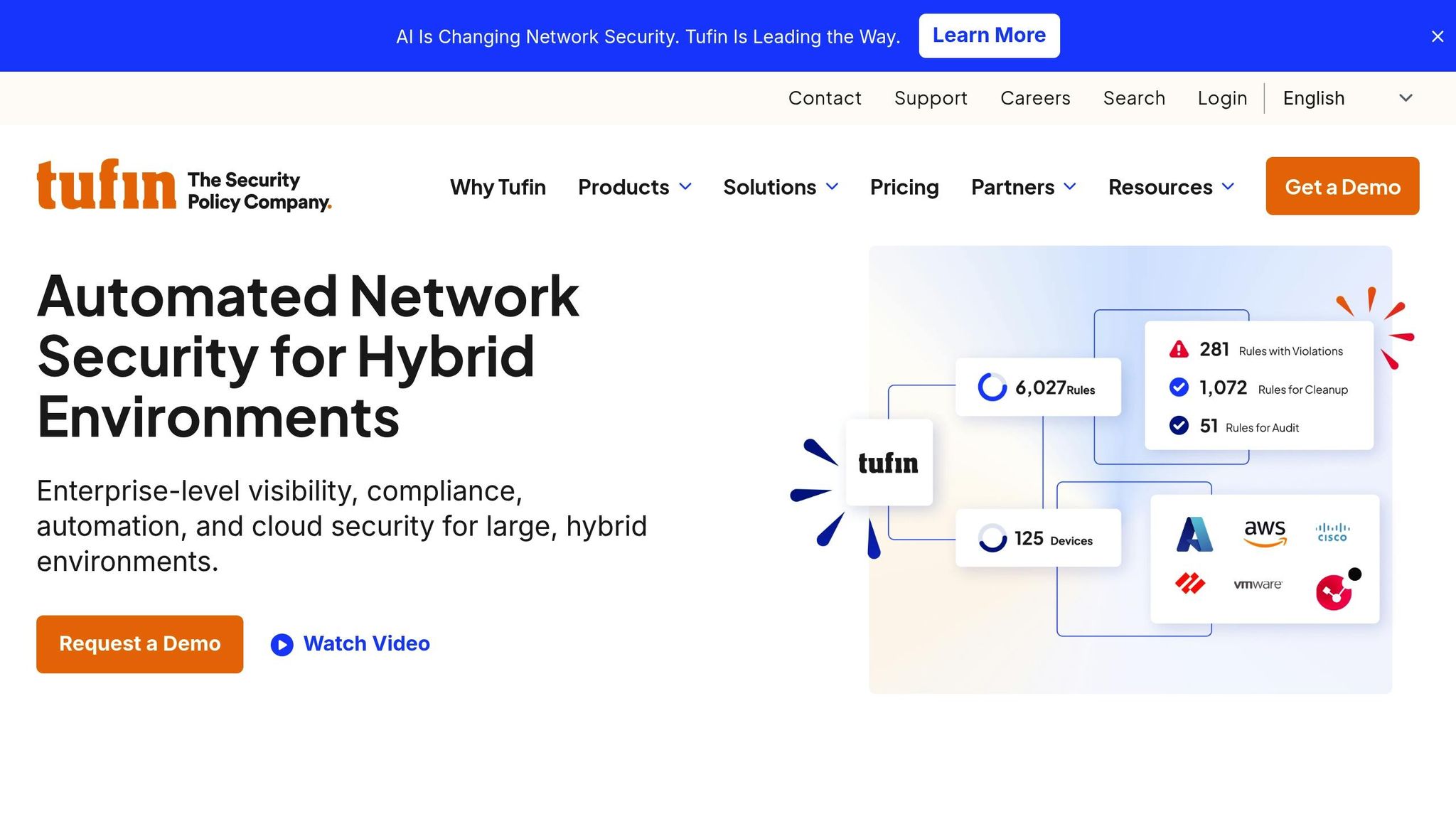
Tufin is a network security platform designed to simplify policy management and automation for businesses operating in hybrid and multi-cloud environments. For UK organisations managing complex IT infrastructures, Tufin offers centralised visibility and a powerful hybrid segmentation toolkit, supporting both on-premises and cloud-based setups.
Tailored for Hybrid and Multi-Cloud Setups
Tufin works seamlessly across on-premises systems, public clouds, and hybrid configurations. It integrates with a variety of cloud providers and on-site networks, ensuring consistent policy enforcement and visibility. This unified approach makes managing distributed networks more efficient and less prone to errors.
Advanced Automation and Policy Management
The platform automates key tasks like network discovery, traffic flow mapping, and policy validation. By streamlining the implementation and updates of segmentation policies, Tufin helps UK businesses maintain consistent security standards across diverse environments while reducing the chances of misconfigurations.
Zero Trust and Microsegmentation in Action
Tufin goes beyond basic policy management by enabling granular security controls that limit lateral movement within the network. This aligns with Zero Trust principles, ensuring that only authorised traffic flows between network segments, which reduces the risk of breaches.
Tools for Compliance and Reporting
Tufin includes built-in tools to help businesses meet regulatory requirements and adhere to internal policies. It generates detailed reports covering policy changes, network activity, and segmentation performance. UK organisations can track essential metrics such as the number of enforced segmentation policies, reductions in unauthorised access attempts, compliance audit success rates, and the time saved through automation. These insights support ongoing improvements in network security.
For UK businesses looking to maximise their Tufin deployments, Hokstad Consulting offers expert guidance and support.
7. Tigera Calico
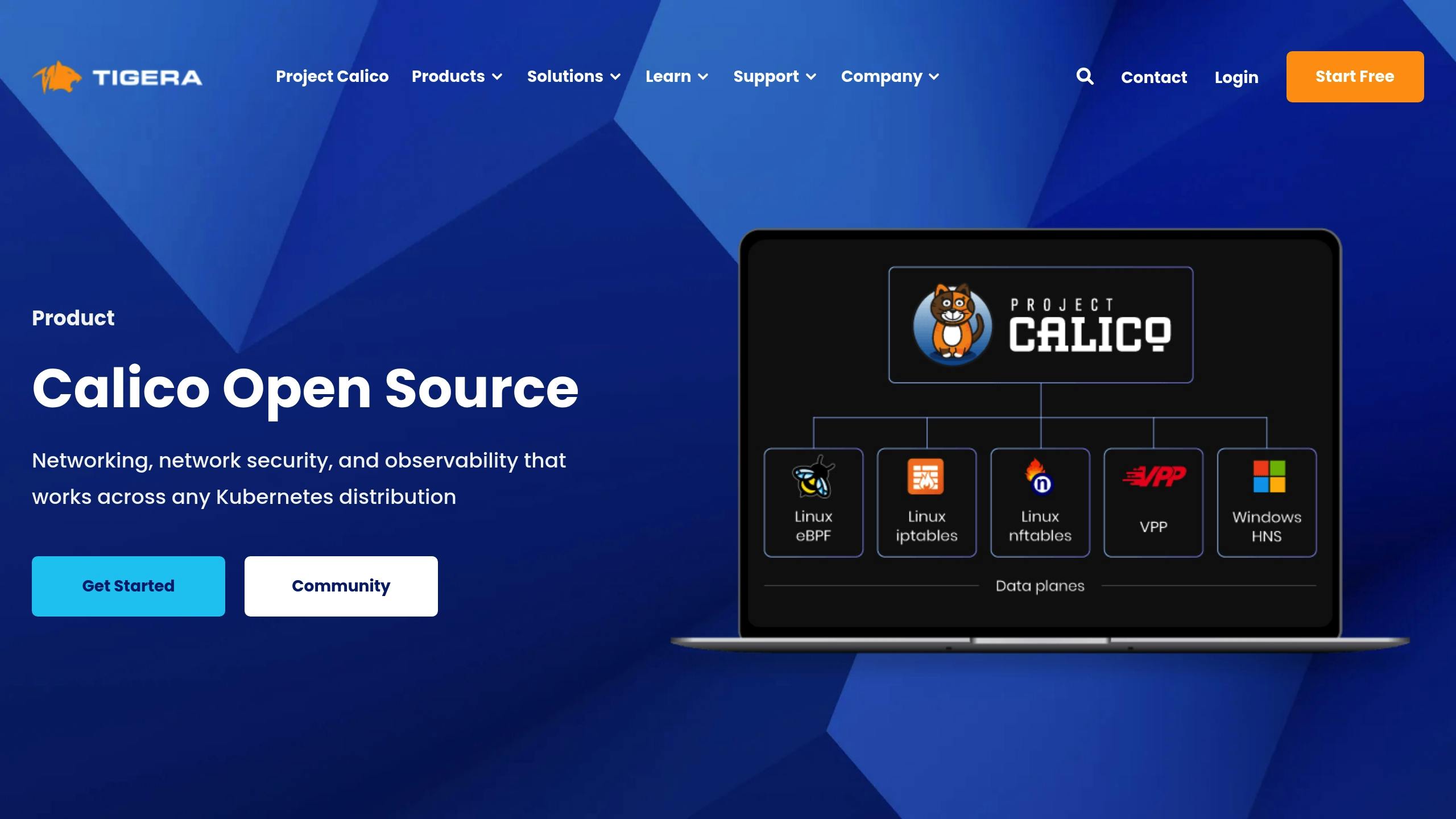
Tigera Calico is a platform designed to enhance network security and provide visibility across hybrid cloud environments. It achieves this through dynamic workload segmentation, offering consistent security policies for containers, virtual machines (VMs), and bare metal servers, no matter where they're deployed.
Support for Hybrid and Multi-Cloud Environments
Calico shines in managing complex hybrid setups by unifying security controls across diverse infrastructures. Whether workloads are on-premises, in public clouds, or part of a hybrid configuration, Calico enforces consistent security policies. This makes it an excellent choice for UK businesses juggling distributed infrastructures, as it simplifies security management across varied environments.
For example, a UK-based financial services provider implemented Calico to secure workloads across its on-premises data centre and AWS cloud infrastructure. By utilising Calico's dynamic segmentation capabilities, the company met regulatory requirements and streamlined its security processes. This unified approach is a solid foundation for adopting Zero Trust principles.
Zero Trust and Microsegmentation Capabilities
Calico adopts a Zero Trust model by enforcing precise, workload-specific policies, ensuring that only authorised communications occur between workloads. Its microsegmentation feature dynamically segments traffic based on workload metadata, adapting as applications scale or move.
This approach significantly reduces the risk of unauthorised lateral movement within hybrid cloud networks. By focusing on securing individual workloads rather than relying on static network boundaries, Calico makes it far harder for threats to spread undetected.
Automation and Policy Management Features
Calico simplifies policy management with automation tools that analyse workload behaviour to recommend optimal security configurations. This reduces the manual workload for IT teams. Additionally, its policy engine allows administrators to stage, preview, and fine-tune policies before deployment, minimising the risk of misconfigurations.
For UK organisations running mission-critical applications, this staging capability is invaluable. It ensures that security changes can be thoroughly tested before being implemented in production environments. The automation also saves time and reduces the chance of human error during policy management.
Compliance and Reporting Tools
Calico provides detailed insights into network activity and policy decisions, creating comprehensive audit trails to support regulatory compliance. UK businesses navigating GDPR and other regulatory frameworks can use Calico to demonstrate effective segmentation, robust access controls, and a strong incident response framework through its detailed reporting features.
Real-time monitoring further strengthens security by enabling teams to quickly identify suspicious activity or policy breaches, ensuring rapid incident response. For UK organisations aiming to optimise their Calico setup and meet specific compliance standards, Hokstad Consulting offers expert guidance and ongoing support to maximise the platform's potential.
Tool Comparison Table
When it comes to selecting the right hybrid cloud network segmentation tool, businesses in the UK need to carefully assess each platform's features. Below is a comparison of seven leading tools, highlighting their capabilities across important criteria.
| Tool | Supported Environments | Segmentation Type | Automation Capabilities | Compliance Support | UK-Specific Considerations |
|---|---|---|---|---|---|
| ManageEngine OpManager Plus | On-premises, cloud, hybrid networks | VLAN, ACL, microsegmentation | AI/ML anomaly detection, automated configuration, adaptive thresholds | Policy assurance, audit trails, compliance reporting | Data residency options, GDPR support, pricing in £ |
| Cisco Secure Workload | SaaS, appliance, hybrid, multi-cloud | Application-level microsegmentation | Automated policy enforcement, workload access control | Granular audit capabilities, regulatory compliance tools | UK/EU data centres, local support teams, VAT-inclusive pricing |
| VMware NSX | Cloud-based, VMware environments, hybrid deployments | Microsegmentation with distributed firewalls | Declarative APIs, automated network virtualisation | Built-in compliance tools, ISO 27001 reporting | UK cloud provider integration, metric units support |
| Illumio Core | On-premises, cloud data centres, scalable hybrid environments | Zero Trust microsegmentation at the workload level | Intelligent policy creation, automated breach response | Risk dashboards, compliance status reporting | GDPR compliance features, UK data residency options |
| Akamai Guardicore Segmentation | Software-based, legacy systems, cloud, hybrid | Flexible microsegmentation with visual flow mapping | Policy translation to device configurations | Compliance mapping, breach containment reporting | UK/EU regulatory alignment, 24-hour time format support |
| Tufin | On-premises, cloud, hybrid deployment options | Automated management of macro- and microsegmentation | Network discovery, traffic flow mapping, policy interpretation | Automated compliance checks, audit report generation | UK/EU compliance standards, local partner support |
| Tigera Calico | Containers, VMs, bare metal, cloud, hybrid | Dynamic microsegmentation with workload-specific policies | Behaviour-based policy recommendations | Detailed audit trails, GDPR compliance support | UK cloud integration, GDPR support |
Each tool brings unique strengths to the table, catering to different business needs. For instance, ManageEngine OpManager Plus stands out for its affordability and ease of use, making it a strong choice for small and medium-sized enterprises (SMEs) looking for comprehensive network monitoring and segmentation capabilities. On the other hand, Cisco Secure Workload offers detailed application-level control, which is particularly suited for larger enterprises, though it often requires a greater financial investment.
If your infrastructure is heavily tied to VMware, VMware NSX offers seamless integration, while Illumio Core excels in providing visibility through its detailed risk dashboards and application dependency mapping. For businesses dealing with legacy systems, Akamai Guardicore Segmentation offers a practical solution to modernise their operations without major disruptions.
For enterprises managing diverse and complex environments, Tufin provides powerful automation for handling multi-vendor setups, ensuring efficient policy management. Meanwhile, Tigera Calico is a standout choice for container-heavy workloads, offering scalable, behaviour-driven policy recommendations.
When it comes to compliance, both Illumio Core and Tigera Calico deliver strong GDPR support, while Cisco Secure Workload and Tufin shine with their advanced audit and reporting tools. In terms of automation, ManageEngine OpManager Plus leverages AI/ML for smarter insights, Tufin excels in managing policies across varied infrastructures, and Tigera Calico adapts seamlessly to dynamic cloud environments.
Ultimately, the best choice depends on your organisation's infrastructure, compliance needs, and long-term goals. For tailored advice on selecting and implementing the right tool, visit Hokstad Consulting.
Conclusion
For UK businesses, choosing the right segmentation tool is essential to maintaining strong security and meeting compliance requirements. The tools we've discussed each bring something distinct to the table - whether it's the budget-friendly benefits of ManageEngine OpManager Plus for smaller organisations or the enterprise-grade application controls offered by Cisco Secure Workload.
Segmentation isn't just a technical upgrade; it's a necessity. With the average cost of a data breach in the UK expected to hit £3.4 million in 2024, as reported by IBM's Cost of a Data Breach Report [3], the stakes couldn't be higher. Companies using microsegmentation are seeing measurable benefits, including up to a 60% reduction in lateral movement during breaches and 40% faster containment of incidents [4]. These numbers highlight the critical need to address the complexities of hybrid environments.
That said, implementing segmentation effectively can be daunting. Tasks like mapping application dependencies, integrating older systems, and maintaining consistent policies across hybrid setups often stretch IT teams to their limits. This is where expert guidance becomes indispensable.
Hokstad Consulting offers UK businesses a way to optimise cloud infrastructure while cutting costs - enabling organisations to focus on robust segmentation strategies. Their methods have delivered impressive results, including a 30–50% reduction in infrastructure expenses alongside improved system performance.
Consider the case of a mid-sized UK financial services firm. By deploying Illumio Core to isolate customer data, the company not only reduced its attack surface but also passed a regulatory audit with minimal remediation required [4].
For UK organisations, the path forward is clear: evaluate your specific needs, prioritise tools with advanced automation and compliance features, and seek expert consultation for tailored solutions. Investing in the right tools and expertise will lead to stronger security, smoother compliance processes, and greater operational efficiency.
FAQs
How can hybrid cloud network segmentation tools help UK businesses ensure GDPR compliance?
Hybrid cloud network segmentation tools play a crucial role in helping UK businesses uphold GDPR compliance by bolstering data security and reducing the chances of unauthorised access. By segmenting networks, these tools ensure that sensitive information remains isolated and accessible only to those with proper authorisation. This approach significantly lowers the risk of data breaches, a key concern under GDPR.
Moreover, these tools enable organisations to monitor and manage data movement between public and private cloud environments. This ensures personal data is handled and stored in accordance with GDPR requirements. With enhanced visibility and control, businesses can meet compliance standards without compromising on operational efficiency.
What role does Zero Trust network segmentation play in improving security for hybrid cloud environments?
Zero Trust network segmentation enhances security in hybrid cloud environments by restricting access to only what each user, device, or application needs. This ensures that if one part of the network is breached, the damage is contained and cannot spread further.
With strict access controls and ongoing trust verification, organisations can minimise the risk of unauthorised access and safeguard critical data. This approach is especially valuable in hybrid cloud setups, where workloads span multiple environments, making older security methods less reliable.
What should UK businesses prioritise when selecting a hybrid cloud network segmentation tool to balance scalability and cost-efficiency?
When UK businesses are choosing a hybrid cloud network segmentation tool, two key factors should take centre stage: scalability, to ensure the tool adapts as the business grows, and cost-efficiency, to make the most of budgets without sacrificing performance.
Hokstad Consulting helps businesses navigate these decisions with tailored cloud solutions designed to cut costs and boost efficiency. Their expertise covers areas like DevOps transformation, cloud cost engineering, and strategic cloud migration, enabling businesses to confidently establish hybrid cloud environments that align with their unique needs.
